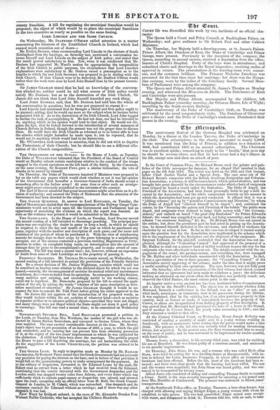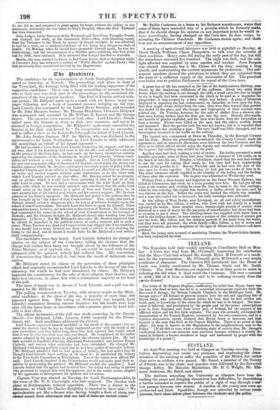be "Metropolis.
The anniversary festival of the German Hospital was celebrated on Monday, by a dinner at the London Tavern; the Duke of Cambridge in the chair. The subscriptions to the charity amounted to nearly 1,000l. It was mentioned that the King of Prussia, in addition to a donation of 3001., had contributed 100/. as an annual subscription. The Chairman was in excellent spirits; remarking in reply to his health," that next day he should be seventy-three, and that he had never had a day's illness in his life, except now and then an attack of gout.
In the Court of Common Pleas, Sir Richard Broun sued the printer and pub- lisher of the Globe newspaper for damages, for an alleged libel inserted in that paper on the 4th July 1844. The action was tried on the 20th and 21st instant, before Chief Justice Tindal and a Special Jury. The case arose out of Sir Richard Broun's connexion with the British American Emigration and Coloniza- tion Association; a scheme, it will be remembered, which proved abortive, and was brought into great discredit by the circumstances under which a body of emigrants were shipped on board a vessel called the Barbadoes. The Duke of Argyll, the President of the Association, had been found personally liable to pay a debt in- curred by the Association; and the Globe commented severely on the manner in which the Association had been got up and conducted. It alleged that it was a "jobbing scheme," got up by "penniless Commissioners and Directors," by wham the Duke of Argyll had "allowed himself to be duped "; and, continued the censhr, by his "becoming the patron and President of the bubble" the public were duped, and emigrants were induced to lodge their money with " the Commis- sioners," and embark on board "the good ship Bardadoes" for Prince Edward's Island; the vessel was compelled to put back, not being seaworthy; and the whole scheme "an enormous humbug," &c. &c. Sir Richard Breen was not named in the article; but, from the prominent part he had acted in getting up the Associa- tion, he deemed himself included in the strictures, and resolved to vindicate his character by an action at law. So far as the case was developed it turned mainly upon the question how far the Association were implicated in the scheme which led to the employment of the Barbadoes and the shipment of the emigrants. Mr. Sergeant Taltourd, for the plaintiff, contended that the Association was not fin- plicated, although its "Consulting Council" had approved of the proposal of a Mr. Haldon to send out a pioneer band of skilled workmen to pave the way for the emigrants who were afterwards tobe sent out. The details connected with the en- gagement of the vessel, the passage-money, and everything else, were managed by Mr. Haldon and other individuals unconnected with the Association. In fact, it was a speculation of two or three persons; the "Consulting Council" of the Association merely approving of the scheme, under the idea that it might prove a useful auxiliary to their own operations. The case, however, was not fully gone into. On Saturday, after the examination of the first witness had closed, counsel intimated that an agreement had been made to withdraw a juror; the defendant making an admission on ono point—that the Barbadoes was perfectly sound; not, observed the Chief Justice, the most serious point in the case.
An inquiry under a very ancient law has been instituted before Commissioners and a Jury at the Sheriff's Court. The object was to ascertain whether John Moessard, formerly a confectioner in the Strand, was an "alien" or not; and what lands, messuages, or tenements, were in his possession during his lifetime. It was explained, that by the existing law, if an alien purchase property in this
i country, such as houses or lands, it mmediately becomes the property of the Crown, as aliens are incapacitated from holding property of that description. It MIS proved that Mr. Moessard had purchased the lease of a house in the Strand, and of another in Craven Street, the yearly value amounting to 1201.; and the Jury returned a verdict to that effect.
At the Central Criminal Court, on Wednesday, Henry Joseph &Herby was convicted of sending a quantity of oxalic acid to a young woman residing in Southwark, with an anonymous letter stating that the poison would make a nice • drink. The prisoner is the lad who was recently tried for sending threatening letters, but acquitted. In the present case, the Jury recommended him to mercy on the score of youth; and he was sentenced to be imprisoned for twelve months, with hard labour.
Thomas Low; a shoemaker, in his seventy-third year, was tried for stabbing his son at Brentford. He was found guilty of a common assault, and sentenced to six months' imprisonment.
On Thursday, John Stone, his son, and a woman who was called Hyde alias Stone, were tried for setting fire to a dwelling-house at Hammersmith, with in- tent to defraud the Union Insurance Company, in whose office an insurance on furniture had been effected. Before the lire, most of the furniture had been re • moved; and there were clear proofs that the burning, had been wilful. The son and the woman were acquitted; but John Stone was found guilty, and was sen- tenced to be transported for twenty years. Alfred Jones was convicted of aiding and counselling Thomas Smith to commit a felony. Smith is the man recently transported for extorting a ten-pound note from Mrs. Hamblin at Camberwell. The prisoner was sentenced to fifteen years' transportation. At the Southwark Police-office, on Tuesday, Thomson, a beer-shop-keeper, vial charged with allowing and urging Bridget Edgar, a young woman with whom he cohabited, to take poison. The two had quarrelled; Edgar mixed some arsenic with water, and threatened to drink it; Thomson told her, with an oath, to take it; she did so; and remained in great agony fir hours without his calling in any assistance; eventually she was taken to Guy's Hospital, where she died. Thomson has been remanded.
John Ledger, lately Surveyor of the Woolwich and New Cross Turnpike Trusts, NUB charged, last week, at the Greenwich Police-office, with obtaining money from the Treasurer to the Trust, by means of forged receipts: he was admitted to bail for a week, on a medical certificate of his being in a dangerous state of health. On Monday, when he should have presented himself again, he was not forthcoming; and the recogmizances of a distiller and a publican, who had given bail for 5001., were estreated. It is surmised that Ledger has fled to America.
Martin, the man stabbed by Facey in Red Cross Street, died on Saturday night. A Coroner's Jury has returned a verdict of" Wilful Murder" against Facey; who had previously been committed for trial by the Magistrates.



























 Previous page
Previous page